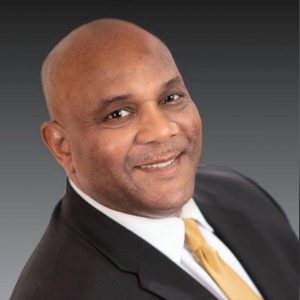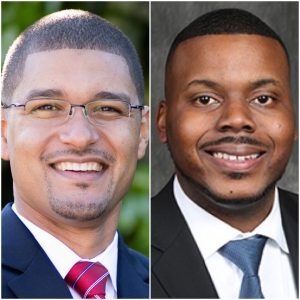#NNPA BlackPress
OP-ED: Ending Workforce Discrimination is Up to Us
NNPA NEWSWIRE — During my tenure at the Conference of Minority Transportation Officials (COMTO), it became clear to me that access was the foundation of economic opportunity. The transportation sector lacked diversity, equity and inclusion, and this was glaringly obvious to both leadership and employees. Pathways began to emerge to grow a diverse pool of talent, but it was obvious that a more organizational framework was needed to operate at full capacity to best serve veterans, women, underrepresented, and underserved workers; groups that had been previously overlooked.

Dwayne Sampson is the Founder and President of the Transportation Diversity Council.
By Dwayne Sampson, Founder and President of the Transportation Diversity Council
Workforce discrimination exists because we often fail to disengage from our own biases. In every industry and in every sector, headlines glaringly reflect on the grievances of the 21st century workforce: gender pay inequity, racial discrimination and ageism. All act as adversarial realities in the fight for economic opportunity and equality.
Advocacy against discriminatory practices could not be more prescient today as far as working men and women are concerned. Today, the American worker faces many challenges as more corporations corrode the promises of a democracy and global competition strips them of a decent living wage. The playing field is not level and the absence of diversity is central in preserving the status quo of systemic discrimination.
During my tenure at the Conference of Minority Transportation Officials (COMTO), it became clear to me that access was the foundation of economic opportunity. The transportation sector lacked diversity, equity and inclusion, and this was glaringly obvious to both leadership and employees. Pathways began to emerge to grow a diverse pool of talent, but it was obvious that a more organizational framework was needed to operate at full capacity to best serve veterans, women, underrepresented, and underserved workers; groups that had been previously overlooked.
The urgency to transform the pipeline of professionals in my field to deter workforce discrimination led me to create the Transportation Diversity Council (TDC) in 2010 in New York. The big idea welded together community partnerships with transportation agencies and businesses—to merge the demands and needs of a sector with individuals who were hungry to work. The lucrative sector had room for a creative repositioning to benefit companies and workers, and this called for dedicated and purposeful action.
Bronx Design and Construction Academy was born in 2011 as a key partner to TDC thanks to the NYC Mayor’s Office and Schools Chancellor Joel Klein. The program set in motion a unique environment of workforce development for underserved students curious about the transportation and construction sector. I’ve had the privilege to invite students from diverse backgrounds and thanks to our quality staff, we’ve given hope and have produced life-changing outcomes to a wide range of students, including low-income, DACA recipients, and international youth.
Today, TDC is also making cross-country strides and demonstrating its workforce development model in key geographies. Local engagement in communities like Anniston, Alabama, is one of TDC’s markers of success with New Flyer of America, the largest transit bus manufacturer in the states.
In various regions, we have been able to help formerly incarcerated workers, like Jason Webster, have a shot at turning their life around. Previously behind bars for 16 years, Jason’s rocky beginnings did not prevent him from a New Flyer career, which kickstarted with programmatic TDC offerings in emotional intelligence, financial health and specialized training. Preparing America’s workforce towards the advancement of diversity, equity and inclusion in our industries requires a holistic program that is based on empathy, confidence-building, guidance and workforce retention.
Partners, like New Flyer, understand that we need to disengage from old biases, and live up to levelling that playing field by working arduously for equal opportunity for the most disenfranchised worker—there are thousands of individuals like Jason across the United States just waiting to have that one chance to triumph and excel after unimaginable hardship. We are here for them. We hope to build upon our success stories where mentoring, work readiness, life skills training and support, all factor in to help a worker get their foot in the door to contribute to society.
Throughout 2020, and as we continue to think about what we can do to empower others, I encourage all entrepreneurs and business owners to reconfigure their talent pipeline to equitably account for diversity. Exposure to opportunity is indeed everything for the American worker. It is the foundation for a democracy and a change agent when it comes to truly closing the door on discrimination.
Dwayne Sampson is the Founder and President of the Transportation Diversity Council.
#NNPA BlackPress
Chavis and Bryant Lead Charge as Target Boycott Grows
BLACKPRESSUSA NEWSWIRE — Surrounded by civil rights leaders, economists, educators, and activists, Bryant declared the Black community’s power to hold corporations accountable for broken promises.

By Stacy M. Brown
BlackPressUSA.com Senior National Correspondent
Calling for continued economic action and community solidarity, Dr. Jamal H. Bryant launched the second phase of the national boycott against retail giant Target this week at New Birth Missionary Baptist Church in Atlanta. Surrounded by civil rights leaders, economists, educators, and activists, Bryant declared the Black community’s power to hold corporations accountable for broken promises. “They said they were going to invest in Black communities. They said it — not us,” Bryant told the packed sanctuary. “Now they want to break those promises quietly. That ends tonight.” The town hall marked the conclusion of Bryant’s 40-day “Target fast,” initiated on March 3 after Target pulled back its Diversity, Equity, and Inclusion (DEI) commitments. Among those was a public pledge to spend $2 billion with Black-owned businesses by 2025—a pledge Bryant said was made voluntarily in the wake of George Floyd’s murder in 2020.“No company would dare do to the Jewish or Asian communities what they’ve done to us,” Bryant said. “They think they can get away with it. But not this time.”
The evening featured voices from national movements, including civil rights icon and National Newspaper Publishers Association (NNPA) President & CEO Dr. Benjamin F. Chavis Jr., who reinforced the need for sustained consciousness and collective media engagement. The NNPA is the trade association of the 250 African American newspapers and media companies known as The Black Press of America. “On the front page of all of our papers this week will be the announcement that the boycott continues all over the United States,” said Chavis. “I would hope that everyone would subscribe to a Black newspaper, a Black-owned newspaper, subscribe to an economic development program — because the consciousness that we need has to be constantly fed.” Chavis warned against the bombardment of negativity and urged the community to stay engaged beyond single events. “You can come to an event and get that consciousness and then lose it tomorrow,” he said. “We’re bombarded with all of the disgust and hopelessness. But I believe that starting tonight, going forward, we should be more conscious about how we help one another.”
He added, “We can attain and gain a lot more ground even during this period if we turn to each other rather than turning on each other.” Other speakers included Tamika Mallory, Dr. David Johns, Dr. Rashad Richey, educator Dr. Karri Bryant, and U.S. Black Chambers President Ron Busby. Each speaker echoed Bryant’s demand that economic protests be paired with reinvestment in Black businesses and communities. “We are the moral consciousness of this country,” Bryant said. “When we move, the whole nation moves.” Sixteen-year-old William Moore Jr., the youngest attendee, captured the crowd with a challenge to reach younger generations through social media and direct engagement. “If we want to grow this movement, we have to push this narrative in a way that connects,” he said.
Dr. Johns stressed reclaiming cultural identity and resisting systems designed to keep communities uninformed and divided. “We don’t need validation from corporations. We need to teach our children who they are and support each other with love,” he said. Busby directed attendees to platforms like ByBlack.us, a digital directory of over 150,000 Black-owned businesses, encouraging them to shift their dollars from corporations like Target to Black enterprises. Bryant closed by urging the audience to register at targetfast.org, which will soon be renamed to reflect the expanding boycott movement. “They played on our sympathies in 2020. But now we know better,” Bryant said. “And now, we move.”
#NNPA BlackPress
The Department of Education is Collecting Delinquent Student Loan Debt
BLACKPRESSUSA NEWSWIRE — the Department of Education will withhold money from tax refunds and Social Security benefits, garnish federal employee wages, and withhold federal pensions from people who have defaulted on their student loan debt.

By April Ryan
Trump Targets Wages for Forgiven Student Debt
The Department of Education, which the Trump administration is working to abolish, will now serve as the collection agency for delinquent student loan debt for 5.3 million people who the administration says are delinquent and owe at least a year’s worth of student loan payments. “It is a liability to taxpayers,” says White House Press Secretary Karoline Leavitt at Tuesday’s White House Press briefing. She also emphasized the student loan federal government portfolio is “worth nearly $1.6 trillion.” The Trump administration says borrowers must repay their loans, and those in “default will face involuntary collections.” Next month, the Department of Education will withhold money from tax refunds and Social Security benefits, garnish federal employee wages, and withhold federal pensions from people who have defaulted on their student loan debt. Leavitt says “we can not “kick the can down the road” any longer.”
Much of this delinquent debt is said to have resulted from the grace period the Biden administration gave for student loan repayment. The grace period initially was set for 12 months but extended into three years, ending September 30, 2024. The Trump administration will begin collecting the delinquent payments starting May 5. Dr. Walter M. Kimbrough, president of Talladega College, told Black Press USA, “We can have that conversation about people paying their loans as long as we talk about the broader income inequality. Put everything on the table, put it on the table, and we can have a conversation.” Kimbrough asserts, “The big picture is that Black people have a fraction of wealth of white so you’re… already starting with a gap and then when you look at higher education, for example, no one talks about Black G.I.’s that didn’t get the G.I. Bill. A lot of people go to school and build wealth for their family…Black people have a fraction of wealth, so you already start with a wide gap.”
According to the Education Data Initiative, https://educationdata.org/average-time-to-repay-student-loans It takes the average borrower 20 years to pay their student loan debt. It also highlights how some professional graduates take over 45 years to repay student loans. A high-profile example of the timeline of student loan repayment is the former president and former First Lady Barack and Michelle Obama, who paid off their student loans by 2005 while in their 40s. On a related note, then-president Joe Biden spent much time haggling with progressives and Democratic leaders like Senators Elizabeth Warren and Chuck Schumer on Capitol Hill about whether and how student loan forgiveness would even happen.
#NNPA BlackPress
VIDEO: The Rev. Dr. Benjamin F. Chavis, Jr. at United Nations Permanent Forum on People of African Descent
https://youtu.be/Uy_BMKVtRVQ Excellencies: With all protocol noted and respected, I am speaking today on behalf of the Black Press of America and on behalf of the Press of People of African Descent throughout the world. I thank the Proctor Conference that helped to ensure our presence here at the Fourth Session of the […]

Excellencies:
-

 Activism4 weeks ago
Activism4 weeks agoOakland Post Endorses Barbara Lee
-

 Activism4 weeks ago
Activism4 weeks agoOakland Post: Week of March 28 – April 1, 2025
-

 Activism3 weeks ago
Activism3 weeks agoOakland Post: Week of April 2 – 8, 2025
-

 #NNPA BlackPress3 weeks ago
#NNPA BlackPress3 weeks agoTrump Profits, Black America Pays the Price
-

 Activism2 weeks ago
Activism2 weeks agoOakland Post: Week of April 9 – 15, 2025
-

 #NNPA BlackPress3 weeks ago
#NNPA BlackPress3 weeks agoHarriet Tubman Scrubbed; DEI Dismantled
-

 #NNPA BlackPress3 weeks ago
#NNPA BlackPress3 weeks agoLawmakers Greenlight Reparations Study for Descendants of Enslaved Marylanders
-

 #NNPA BlackPress3 weeks ago
#NNPA BlackPress3 weeks agoTrump Targets a Slavery Removal from the National Museum of African-American History and Culture

























































